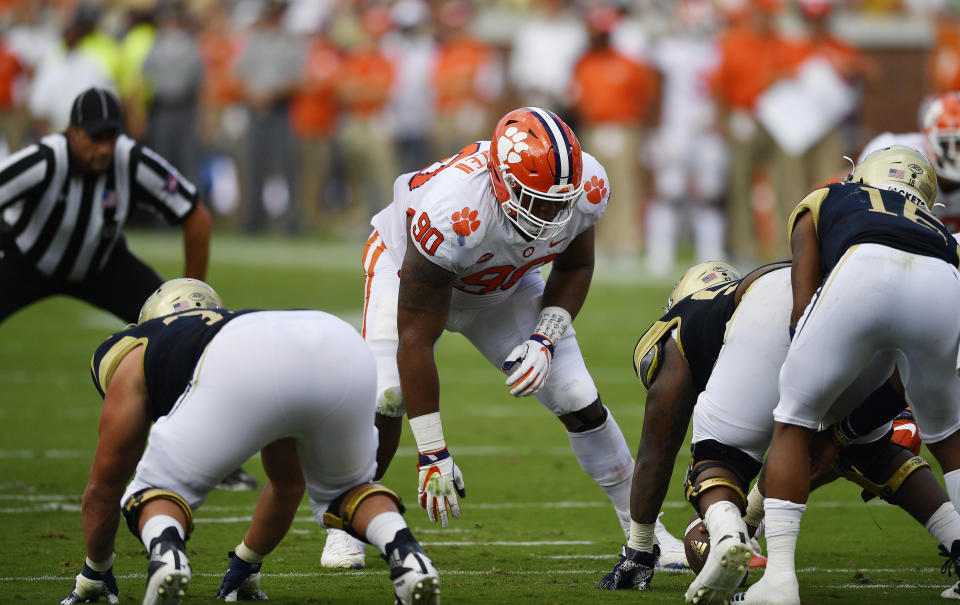Dexter Lawrence among 3 Clemson players who failed NCAA drug test, could miss Cotton Bowl
Clemson could be without three players in the College Football Playoff semifinal matchup with Notre Dame — including one of its best players.
Upon the team’s arrival in Dallas on Monday, Tigers coach Dabo Swinney told reporters that defensive lineman Dexter Lawrence, offensive lineman Zach Giella and tight end Braden Galloway failed NCAA-mandated drug tests last week.
According to Tiger Illustrated, the players tested positive for ostarine.
Unless Clemson successfully appeals the failed tests, all three will miss Saturday’s Cotton Bowl. The biggest loss would be Lawrence, one of the top players at his position in the country. A three-year starter at defensive tackle, Lawrence has 36 tackles and seven tackles for loss for the second-ranked Tigers this season.
The junior, who plays on an elite D-line unit alongside Christian Wilkins, Clelin Ferrell and Austin Bryant, is projected to be a first-round NFL draft choice.
Giella, a redshirt junior, is a reserve who has seen time at center and guard. Galloway, a freshman, has five catches for 52 yards and a touchdown.
Swinney: ‘Trace’ of ostarine found
Swinney said Monday that he believes the players did not knowingly ingest ostarine. He told reporters that a “trace” of the substance was found for the three players. The failed tests have been appealed and the program is awaiting a response from the NCAA.
As of Monday Clemson remains in the appeals process with the NCAA. All three players will have legal representation. All three are out for Saturday’s Cotton Bowl barring a successful appeal before then.
Swinney told reporters all three players thought it was a joke when he called them to notify each of their failed drug test.
Swinney said the three players have submitted a B sample to be tested. They expect to find out the players’ fate later this week. If the B sample is positive, the players cannot play. If it’s negative, they can play on Saturday.
What is ostarine?
Here is how the U.S. Anti-Doping Agency defines ostarine:
Ostarine is the trademarked name for a Selective Androgen Receptor Modulator (SARM) that is not approved for human use or consumption in the U.S., or in any other country. In recent years, WADA has reported an increasing number of positive tests involving SARMs, and athletes who use these substances most likely obtain them through black market channels.
Research has shown that SARMs like ostarine have fewer androgenic properties, meaning they have less influence on the development and balance of male hormones, including testosterone. While they are not yet approved for human use, SARMs are of interest to the medical community because they might be effective at treating different health conditions without resulting in the negative side effects of steroids. Ostarine is currently being investigated as a way to treat a variety of muscle wasting diseases, such as osteoporosis, cancer, and hypogonadism.
Swinney told reporters that the players have no clue how ostarine ended up in their system and that the substance can be found in some everyday products.
“This could have come from hair products, cream, protein, a product you buy online and you think nothing is wrong with it. It could be something in a drink,” Swinney said.
According to the USADA, however, it is only found in “illegal” products and is sometimes put into supplements but omitted from the product’s label:
There are in fact products that contain ostarine, but only illegal ones. Given that ostarine is not approved for human use or consumption in the U.S., or in any other country, there are no legal medications that contain ostarine.
It’s also important to note that ostarine is not a permitted ingredient in dietary supplements. However, you should be aware that some dietary supplement manufacturers illegally put SARMs like ostarine in their products and sell them as “legal steroids” or “research only” chemicals. Moreover, they may omit ostarine from the label entirely, or use misleading names to confuse consumers.
Swinney said other NCAA athletes have tested positive for the substance in recent years, and several were cleared after a B sample was tested.
Whether that comes to fruition for the Clemson players remains to be seen.

More from Yahoo Sports:
• Watch: Falcons punter crushes player with huge tackle
• NFL Winners and Losers: Foles’ strange career
• Late hit sparks brawl, leads to 49ers star’s ejection
• Raiders reportedly consider wild London plan for 2019

